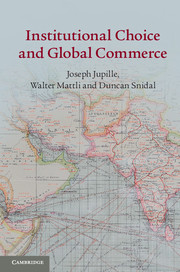2 - International institutional choice
Cooperation, alternatives, and strategies
Published online by Cambridge University Press: 05 June 2014
Summary
Introduction
Choice requires alternatives. In the anarchic but variably institutionalized international system, states almost always confront multiple institutional possibilities and options. Which institutions do they choose (if any), and how and why do they do so? Institutional international relations (IR) theory has frequently addressed how existing institutions operate and how they shape outcomes, as well as how they come about and change against a backdrop of anarchy. But it has not systematically addressed choice among multiple institutional alternatives or strategies for how to engage institutions. What explains the ways in which institutions come into play in international relations?
Answering this question will integrate and advance the institutional research program and is the broad goal of this book. This chapter begins that process by spelling out general expectations about the conditions under which alternative institutional strategies will be pursued. We elaborate a novel conceptualization of institutional strategy by defining a repertoire of actions – Use, Selection, Change, and Creation – constituting the set of ways in which institutions can be engaged. We assume that international actors are boundedly rational, and we argue that they choose institutional strategies in response to interactions between cooperation problems and the institutional status quo. The greater the suitability of status quo institutional arrangements for addressing the cooperation problem at hand, the more likely actors are to work within existing institutions. Conversely, the more deficient the institutional status quo, the more likely actors are to choose costlier and riskier strategies that transform the institutional landscape. Below we develop a series of more specific claims linking cooperation problems, institutional alternatives in the status quo, and the choice of institutional strategies. The remainder of the book evaluates these claims with an extended analysis of institutional choice and global commerce.
- Type
- Chapter
- Information
- Institutional Choice and Global Commerce , pp. 19 - 52Publisher: Cambridge University PressPrint publication year: 2013
- 1
- Cited by



